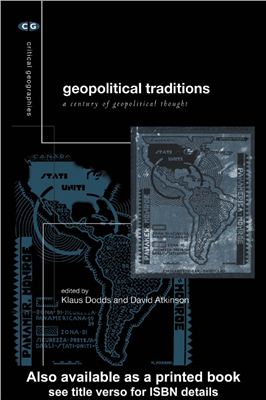Routledge, 2000. 392 p.
Condemned as an intellectual poison by the late American geographer Richard Hartshoe, geopolitics has confounded its critics. Today it remains a popular and important intellectual field despite the persistent allegations that geopolitics helped to legitimate Hitler’s policies of spatial expansionism and the domination of place. Using insights from critical geopolitics and cultural history, the contributors focus on how geopolitics has been created, negotiated and contested within a variety of intellectual and popular contexts.
Geopolitical Traditions argues that geopolitics has to take responsibility for the past while at the same time reconceptualizing geopolitics in a manner which accounts for the dramatic changes in the late twentieth century. The book is divided into three sections: first ‘Rethinking Geopolitical Histories’ concentrates on how geopolitical conversations between European scholars and the wider world unfolded; second ‘Geopolitics, Nation and Spirituality’ considers how geopolitical writings have been strongly influenced by religious iconography and doctrine, with examples drawn from Catholicism, Judaism and Hinduism; and third ‘Reclaiming and Refocusing Geopolitics’ contemplates how geopolitics has been reformulated in the post-war period with illustrations from France and the United States. Geopolitical Traditions brings together scholars working in a variety of disciplines
and locations in order to explore a hundred years of geopolitical thought.
Introduction to geopolitical traditions: a century of geopolitical thought. Dodds Klaus, Atkinson David
Rethinking geopolitical histories
Fin de si?cle, fin du monde?
On the origins of European geopolitics, 1890–1920. Michael Heffean
The construction of geopolitical images: the world according to Biggles (and other fictional characters). Andrew Kirby
Japanese geopolitics in the 1930s and 1940s. Keiichitakeuchi
Geopolitical imaginations in mode Italy. David Atkinson
Iberian geopolitics. James Derrick Sidaway
Geopolitics and the geographical imagination of Argentina. Klaus Dodds
Geopolitics, nation and spirituality.
Spiritual geopolitics: Fr. Edmund Walsh and Jesuit anti-communism. Garoid o Tuathail (Gerard Toal)
Representing post-colonial India: inclusive/exclusive geopolitical imaginations. Sanjay Chaturvedi
Reclaiming and refocusing geopolitics
H?rodote and the French Left. Paul Claval
G?opolitiques de Gauche: Yves Lacoste, H?rodote and French radical geopolitics. Leslie W.Hepple
Citizenship, identity and location: the changing discourse of Israeli geopolitics. David Newman
Refiguring geopolitics: the Reader’s Digest and popular geographies of danger at the end of the Cold War. Joanne Sharp
Toward a green geopolitics: politicizing ecology at the Worldwatch Institute. Timothy W. Luke
Futures and possibilities
Geopolitics, political geography and social science. Peter J. Taylor
It’s the little things. Nigel Thrift
Condemned as an intellectual poison by the late American geographer Richard Hartshoe, geopolitics has confounded its critics. Today it remains a popular and important intellectual field despite the persistent allegations that geopolitics helped to legitimate Hitler’s policies of spatial expansionism and the domination of place. Using insights from critical geopolitics and cultural history, the contributors focus on how geopolitics has been created, negotiated and contested within a variety of intellectual and popular contexts.
Geopolitical Traditions argues that geopolitics has to take responsibility for the past while at the same time reconceptualizing geopolitics in a manner which accounts for the dramatic changes in the late twentieth century. The book is divided into three sections: first ‘Rethinking Geopolitical Histories’ concentrates on how geopolitical conversations between European scholars and the wider world unfolded; second ‘Geopolitics, Nation and Spirituality’ considers how geopolitical writings have been strongly influenced by religious iconography and doctrine, with examples drawn from Catholicism, Judaism and Hinduism; and third ‘Reclaiming and Refocusing Geopolitics’ contemplates how geopolitics has been reformulated in the post-war period with illustrations from France and the United States. Geopolitical Traditions brings together scholars working in a variety of disciplines
and locations in order to explore a hundred years of geopolitical thought.
Introduction to geopolitical traditions: a century of geopolitical thought. Dodds Klaus, Atkinson David
Rethinking geopolitical histories
Fin de si?cle, fin du monde?
On the origins of European geopolitics, 1890–1920. Michael Heffean
The construction of geopolitical images: the world according to Biggles (and other fictional characters). Andrew Kirby
Japanese geopolitics in the 1930s and 1940s. Keiichitakeuchi
Geopolitical imaginations in mode Italy. David Atkinson
Iberian geopolitics. James Derrick Sidaway
Geopolitics and the geographical imagination of Argentina. Klaus Dodds
Geopolitics, nation and spirituality.
Spiritual geopolitics: Fr. Edmund Walsh and Jesuit anti-communism. Garoid o Tuathail (Gerard Toal)
Representing post-colonial India: inclusive/exclusive geopolitical imaginations. Sanjay Chaturvedi
Reclaiming and refocusing geopolitics
H?rodote and the French Left. Paul Claval
G?opolitiques de Gauche: Yves Lacoste, H?rodote and French radical geopolitics. Leslie W.Hepple
Citizenship, identity and location: the changing discourse of Israeli geopolitics. David Newman
Refiguring geopolitics: the Reader’s Digest and popular geographies of danger at the end of the Cold War. Joanne Sharp
Toward a green geopolitics: politicizing ecology at the Worldwatch Institute. Timothy W. Luke
Futures and possibilities
Geopolitics, political geography and social science. Peter J. Taylor
It’s the little things. Nigel Thrift

